ROME – After Pope Francis made remarks in a recent interview implying that Ukraine ought to raise a “white flag” and open negotiations in its ongoing war with Russia, his remarks were met with fierce backlash from both Ukrainian civil and ecclesial authorities.
Speaking while making a visit to the Ukrainian Greek Catholic parish of Saint George in New York, Major Archbishop of the Ukrainian Greek Catholic Church (UGCC) said in response to the pope’s remarks, “in Ukraine no one has the possibility of surrendering.”
“Ukraine is wounded but undefeated. Ukraine is exhausted but remains standing,” Major Archbishop is Sviatoslav Shevchuk said, telling those who are skeptical about Ukraine’s ability to continue resisting Russia’s military offensive to “come to Ukraine and see!”
Similarly, the Ukrainian Embassy to the Holy See said that “it is very important to be consistent.”
“When we speak about a third world war, which we have now, it is necessary to learn from the second war: did anyone then seriously talk about negotiating peace with Hitler and the white flag to satisfy him?” the embassy said.
The lesson to be learned, then, they said, is “if we want to end the war, we must do everything to kill the Dragon!”
On Saturday, a new papal interview was published on Swiss broadcaster RSI that was recorded Feb. 2, and which is expected to be broadcast in full on March 20 as part of a new cultural program.
During the interview, Pope Francis made waves when asked about the debate between those who say Ukraine ought to raise a “white flag” and surrender as it has not been able to overcome Russia forces, and those who argue that doing so would legitimize Russia’s actions.
In response, Francis said he believes “the strongest one is the one who looks at the situation, thinks about the people and has the courage of the white flag, and negotiates.”
“The word negotiate is a courageous word. When you see that you are defeated, that things are not going well, you have to have the courage to negotiate,” he said, noting that many countries, including Turkey, have voiced a willingness to mediate.
The pope’s remarks were the first time he had used the term “white flag” or “defeated” in reference to the Ukraine war, sparking immediate blowback from Ukrainian authorities and allies who have supported Ukraine for past two years, since Russia’s full-scale invasion in February 2022.
In response to the pope’s remarks, Ukrainian Foreign Minister Dmytro Kuleba authored a post on social media platform X saying Ukraine’s flag “is yellow and blue.”
“This is our flag with which we live, die and conquer. We will never raise other flags,” he said, and voiced gratitude to Pope Francis for his continual prayers for peace in Ukraine, saying he still hopes the pope will be able to visit Ukraine to support local Catholics and those impacted by the war.
Kremlin spokesman Maria Zakharova spoke to Italian media following the pope’s remarks, saying the pontiff was not speaking to Kyiv, but to the West, which she said is using Ukraine as “an instrument” of its “ambitions.”
“The way I see it, the pope is asking the West to put aside its ambitions and admit that it was wrong,” she said, saying, “every expert, every diplomat today understands” that the situation in Ukraine “is at a dead end” and that many countries and international leaders have asked for negotiations.
Vatican spokesman Matteo Bruni attempted to smooth things over after the backlash, issuing a statement Saturday saying the term “white flag” had been used by the interviewer, and that Pope Francis had simply repeated it “to indicate a cessation of hostilities and a truce reached with the courage of negotiations.”
“His hope is a diplomatic solution for a just and lasting peace,” Bruni said.
However, Pope Francis has also faced pressure from his own flock and from other Christians for the remarks.
The Christian Association of Ukrainians in Italy called the pope’s remarks “shocking, embarrassing, and deeply offensive.”
Similarly, in a March 10 statement, the bishops of the Permanent Synod of the Ukrainian Greek Catholic Church, who are currently meeting in the United States, also weighed in, voicing concern but appearing to offer the pontiff the benefit of the doubt.
In their statement, the synod noted that the pope’s remark about the “white flag,” according to Bruni, was a summons to negotiation and not surrender, and that Francis had also spoken of the war in Gaza between Israel and Hamas.
In this sense, they said Ukrainian citizens are “wounded yet unbroken, tired yet resilient.”
“Ukrainians cannot surrender because surrender means death. The intentions of Putin and Russia are clear and explicit. The aims are not those of one individual,” they said, saying 70 percent of Russian citizen are “clear and explicit” in their support for “the genocidal war against Ukraine.”
Both the Russian Orthodox Patriarchate and its patriarch, Kirill, they said, support the war and back Russian President Vladimir Putin’s ambitions.
For Putin, they said, “there is no such thing as Ukraine, Ukrainian history, language, and independent Ukrainian Church life. All matters Ukrainian are ideological constructs, fit to be eradicated…The ideology of Ukrainian identity, according to Putin, is ‘Nazi.’”
“By calling all Ukrainians (who refuse to be Russians and accept Russian rule) ‘Nazis,’ Putin dehumanizes them,” they said, saying Ukrainians are seen as a people “to be annihilated, killed,” and that alleged war crimes in cities such as Bucha, Irpin and Izium prove it.
They also argued that Russian occupation of Ukrainian territory has led to “the eradication of the Ukrainian Catholic Church” and of an independent Ukrainian Orthodox Church, as well as the suppression of other religious traditions and institutions that do not support “Russian hegemony.”
“Ukrainians will continue to defend themselves. They feel they have no choice. Recent history has demonstrated that with Putin there will be no true negotiations,” they said, noting that Ukraine in 1994 negotiated away its nuclear arsenal, at the time the third largest in the world, and in return received guarantees of territorial integrity.
However, that memorandum, signed by Russia, the United States and the United Kingdom, they said, “is not worth the paper on which it was written. So it will be with any agreement ‘negotiated’ with Putin’s Russia.”
In light of suggestions from Pope Francis and other world leaders that Ukraine open itself to negotiations, the synod said that regardless of these calls, “Ukrainians will continue to defend freedom and dignity to achieve a peace that is just.”
“They believe in freedom and God-given human dignity. They believe in truth, God’s truth. They are convinced that God’s truth will prevail,” they said.
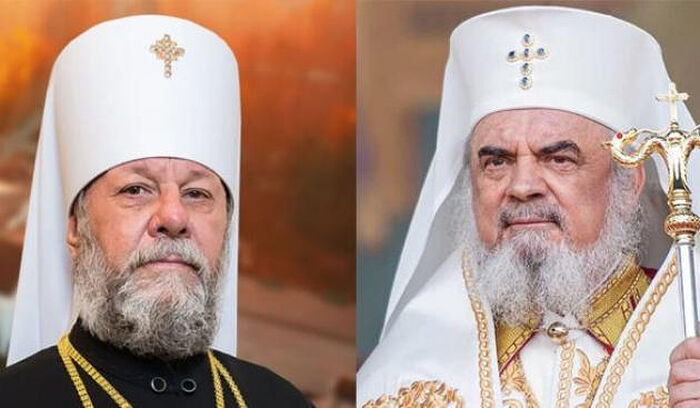
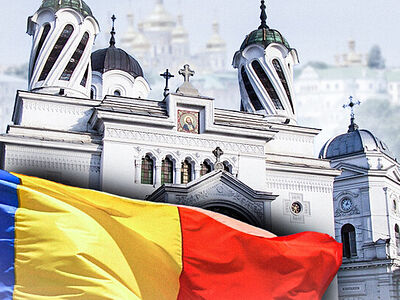 Romanian Synod establishes “Romanian Orthodox Church of Ukraine,” Ukrainian hierarch respondsA number of important decisions were made during the session of the Holy Synod of the Romanian Orthodox Church held in Bucharest on February 29.
Romanian Synod establishes “Romanian Orthodox Church of Ukraine,” Ukrainian hierarch respondsA number of important decisions were made during the session of the Holy Synod of the Romanian Orthodox Church held in Bucharest on February 29.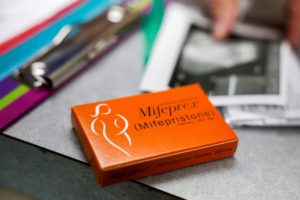


 Macedonian Church receives tomos of autocephaly from Serbian Church“Today, by the grace of God, we have the opportunity to ratify what already exists between us, this unity that was once disturbed,” Pat. Porfirije stressed.
Macedonian Church receives tomos of autocephaly from Serbian Church“Today, by the grace of God, we have the opportunity to ratify what already exists between us, this unity that was once disturbed,” Pat. Porfirije stressed. Macedonian Church rejects communion with Ukrainian schismaticsThe Holy Synod of the MOC decided to wait until the OCU’s status is finalized for the whole Church.
Macedonian Church rejects communion with Ukrainian schismaticsThe Holy Synod of the MOC decided to wait until the OCU’s status is finalized for the whole Church. Macedonian bishop explains: Constantinople doesn’t recognize MOC as autocephalous because of its stance towards Ukrainian schismatics“The ‘Orthodox Church of Ukraine’ is a non-canonical church. They were ordained without grace,” Met. Timotej explained.”>according to His Eminence Metropolitan Timotej of Debar and Kičevo.
Macedonian bishop explains: Constantinople doesn’t recognize MOC as autocephalous because of its stance towards Ukrainian schismatics“The ‘Orthodox Church of Ukraine’ is a non-canonical church. They were ordained without grace,” Met. Timotej explained.”>according to His Eminence Metropolitan Timotej of Debar and Kičevo.  Macedonian Orthodox Church is “studying the status” of the Ukrainian schismatics“The Synod devoted serious attention to the study of the Ukrainian ecclesiastical issue and established a commission that will study the status of the Orthodox Church in Ukraine, which received autocephaly from the Ecumenical Patriarchate,” the Synodal report states.
Macedonian Orthodox Church is “studying the status” of the Ukrainian schismatics“The Synod devoted serious attention to the study of the Ukrainian ecclesiastical issue and established a commission that will study the status of the Orthodox Church in Ukraine, which received autocephaly from the Ecumenical Patriarchate,” the Synodal report states. Macedonian-Ohrid Church issues statement on its name and autocephalyThe hierarchs of the Synod gathered in a regular session yesterday, February 21. Among the topics discussed was the Church’s relations with other Local Churches.
Macedonian-Ohrid Church issues statement on its name and autocephalyThe hierarchs of the Synod gathered in a regular session yesterday, February 21. Among the topics discussed was the Church’s relations with other Local Churches. Greek Churches can call us “Ohrid,” but we will call ourselves “Macedonian”—MOC primateDespite the joy of a previously schismatic Church of millions of people returning to the fold of the Orthodox Church, the issue of the Church’s name often takes center stage.
Greek Churches can call us “Ohrid,” but we will call ourselves “Macedonian”—MOC primateDespite the joy of a previously schismatic Church of millions of people returning to the fold of the Orthodox Church, the issue of the Church’s name often takes center stage. Constantinople enters into communion with Macedonian ChurchAccording to the new statement, Constantinople accepts the hierarchy, clergy, and laity of the MOC into communion under the name of “Ohrid,” thus “healing the wound of schism.”
Constantinople enters into communion with Macedonian ChurchAccording to the new statement, Constantinople accepts the hierarchy, clergy, and laity of the MOC into communion under the name of “Ohrid,” thus “healing the wound of schism.”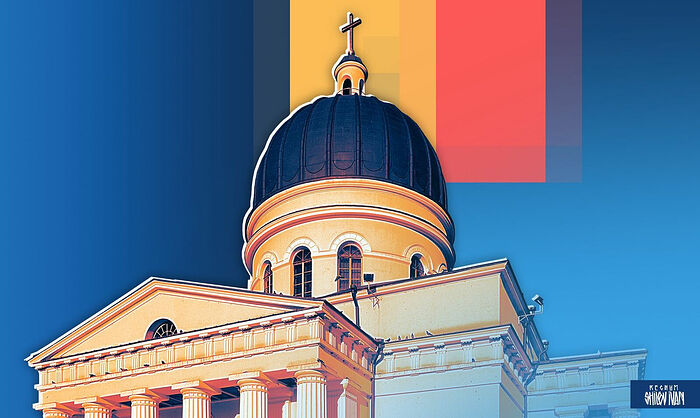
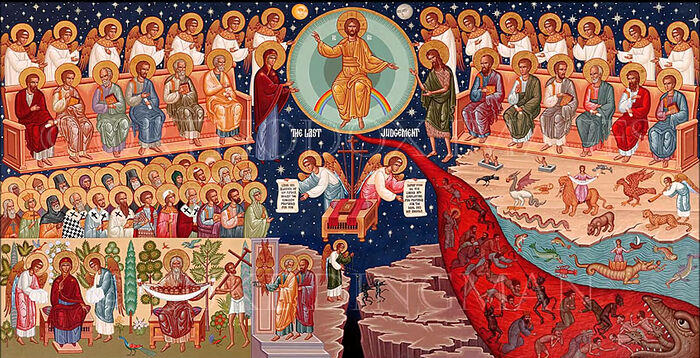
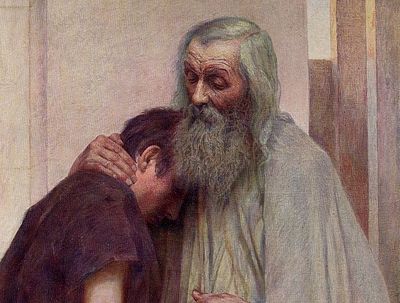 The Prodigal Son and UsThe children should learn, one way or another, about the world full of illusory dreams, fantasies, and satanic lies, and then return to a place where they were happy.
The Prodigal Son and UsThe children should learn, one way or another, about the world full of illusory dreams, fantasies, and satanic lies, and then return to a place where they were happy. Holy Prophet Daniel Among the chosen youths Daniel had three friends: Ananias, Azarias and Misail. All four steadfastly preserved their faith in the one true God and together refused to eat the king’s food for fear breaking one of Moses’ laws. They asked their overseer to give them only bread and vegetables, but the overseer was afraid that they would become thin and he would be made to suffer the king’s wrath. Daniel persuaded him to make a test and allow them to observe this regimen for ten days.
Holy Prophet Daniel Among the chosen youths Daniel had three friends: Ananias, Azarias and Misail. All four steadfastly preserved their faith in the one true God and together refused to eat the king’s food for fear breaking one of Moses’ laws. They asked their overseer to give them only bread and vegetables, but the overseer was afraid that they would become thin and he would be made to suffer the king’s wrath. Daniel persuaded him to make a test and allow them to observe this regimen for ten days.